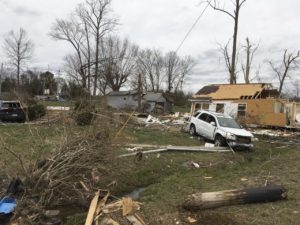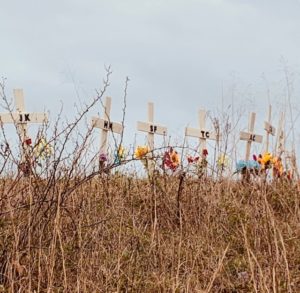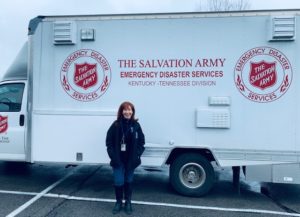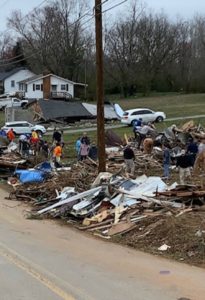COOKEVILLE, TN (Putnam County) March 2–3, 2020.
It’s the dead of night. Two a.m. Jessica Baldwin (not her real name) is fast asleep, her husband by her side, her three young children also asleep down the hall. The loud piercing sound breaks through the quiet fog of dreamers. Annoyed, Jessica is thinking it’s just an Amber Alert and had every intention of ignoring it. But some unseen hand forced her to pick up her phone. Call it luck. Call it divine intervention. Jessica and her family had no siren, no other warning that a tornado was about to hit. Two minutes. That’s all the time the Baldwin family had to get someplace safe. Days later with her gaze staring off Jessica recalled the experience and that horrible sound as the tornado carved a wide and deadly path into the land like a tsunami. “If I had not picked up that phone,” she told me, not finishing her sentence as we stood on her porch. Letting the horror of that thought marinate for a second. “The damage to my house was minimal,” Jessica went on. “Whatever we lost can be replaced. We made it through. But others were not so lucky.”
At last count twenty-five were dead. Whole families decimated. Children. Seniors. The weak. The strong. The vulnerable. This was a killer, fast, silent, unknowing, uncaring of borders or boundaries.
I walked through the heaps of debris beside a twenty-year-old woman searching for anything salvageable from the bombed-out ruins of her apartment building. I listened to an elderly woman with a broken leg pointing to the slab of concrete where her home used to be, telling me she and her husband took refuge in the bathtub only to be sucked into the vortex of the tornado before it spit them out into the night. I stood at the supermarket beside another woman who’d just lost her daughter, while people stopped to offer their condolences. Seeing her veneer of bravery refuse to crack under the weight of this unimaginable emotion, I was a dam barely holding it together. I wanted to throw my arms around her and hug her, and I almost did. Because that’s what I do when there’s nothing left but the bottom. But those days are gone now.
“I came to explore the wreck,” wrote Adrienne Rich. “The words are purposes. The words are maps. I came to see the damage that was done and the treasures that prevail.”
Street to street, house to house, I go. I explore the wreckage of people’s lives. I lay myself bare to the avalanche of these stories which are the maps I use to navigate from the tragedy to the treasures that eventually prevail.
The usual course after a disaster is helping the survivors toward recovery. Getting them registered with FEMA, referrals to Small Business Administration loans and where to acquire the basic needs: food, water, clothing, and so on. Somewhere in between the citizens of Cookeville and the two other affected counties were losing touch. Somewhere in between, they were trying to pick up the pieces. Somewhere in between, they thought they’d have time to grieve, to wrap their heads around this horrible thing that tore their world apart. But they didn’t. Because another monster had come to roost.
Amidst the chaos and uncertainty of a global crisis, this community is doubly weighted. Can you imagine losing a child, a mother, a father, a brother, a sister, a neighbor and then having to scramble around looking for a place to live, water or toilet paper when the shelves are bare?
This speaks directly to the importance of community partners and volunteers during these disasters. The role they place is crucial in the equation of recovery. And like so many other deployments I’ve been on, here too the response of volunteers from every corner was overwhelming. Whether it’s sorting debris to enable county pickup, ride trucks to hand out food for survivors, pass out coffee, man the shelters, help stock the local churches and community centers distributing clothes and toiletries, without them, survivors would struggle even more to get back on their feet. And my job would be next to impossible.
So with a highly contagious virus on the loose, imagine that next disaster which isn’t that far off (fire, tornado, hurricane, flood, whatever. I’ve been awfully busy). Who’s going to show up for the survivors? Will they at all, and how many? Imagine no hotels open to house them? No restaurants to feed them? Everything about the recovery process will be changed. Diminished in its capacity and success.
What we are experiencing is unprecedented. We are ushering in a new world with new guidelines. This virus has turned everything we know on a dime. No one really knows yet how it will all play out. What to expect. What the final economic and human toll will be. Whether we’ll revert to the old normal or press forward into this new normal. Hey! This is my first global pandemic. And I’ll bet it’s yours as well. So, you’re right there in the trenches with me.
These are all hard things to digest. Frightening. And this fear we own is a vulnerability. An unknown. Something alien. And the only way to get to the other side, I mean the only way … is to push through the middle. One day at a time. That’s how we begin. We stick together. We pray — if praying is your thing. We take a breath. We push one foot in front of another. Because that’s what our DNA tells us to do.
Maybe not today or tomorrow. Lots of us are still trying to wrap our brains around the fact that this is serious shit. That and we don’t have all the answers to a whole bunch of important questions. How do we cope? How do we survive? How do we get through the isolation? What about money? Food? Our jobs? Do I pay my rent? My mortgage? The list goes on and on. We know the world is a dangerous place. That, as a species, we’ve never been more vulnerable. We’re killing our planet and ourselves. We know some of us will get hit harder than others. The homeless, the innocents, the elderly, the young, those living on the edge, the children who rely on school for two solid meals, the communities who typically never fare well when any disaster strikes. And yet, as grim as all this sounds, we also know love reigns supreme.
It’s the saving grace that will get us through this fucking mess. It will be the light at the end of the tunnel. The Hershey kiss of divinity inside each of us that will shine brightly. Because light always overcomes the dark, and good destroys evil. Always. Whether we choose to believe this or not.
So here’s the thing: it’s all about accepting and adapting. Many of us will feel isolated, alone. But take heart. There are absolutely things we can do to combat those feelings. Go for a walk. FaceTime, Skype, email, phone friends and loved ones on a regular basis, staying as socially connected as possible; especially when we all pretty much know it’s going to get a lot worse before it gets better. Again, this is where the crazy glue sticking together part comes in. We ask for help. We give help. We open the lines of communication with our neighbors. If we have extra hand sanitizer, we share. We add encouragement and toilet paper humor to the daily conversation. We finish projects that have gone by the wayside. Puzzles are fantastic ways to work through the anxiety. We help feed the children and the homeless. Online is good. Safe. Easy peasy lemon squeezy. And there are some organizations around the world already doing a fantastic job of just that for those who really need it. That’s our Chicken Soup for the Soul, the pot of goodness and kindness. The spiritual Band-aid of solace which goes a long, long way and in equal directions. It’s grace and courage under fire.
As a writer, even though I’m not on the same religious plain as author Anne Lamott, I’ve learned so much from her on this particular subject. “Grace is spiritual WD-40,” she says. “We go from clenched, to plop, to breathing again. We get our sense of humor back — a miracle.”
We are swimming in uncharted waters that are murky, wild and weird. It is the beginning for us of many new “firsts.” Including but not limited to an evolution of ourselves and our humanity where we will be tested in unimaginable ways, profound ways, spiritual ways, and come out a million times better for it. I say this because if you just take a step back from the frenzy buying of toilet paper and antibacterial wipes, you’d see very clearly that this response to the process is actually a remarkable collective moment for us as a country. One galvanizing with spirit as each of us does our part to flatten the curve. And that, my friends, is our true call to arms.
Growing up, my mother spent a lot of time gathering people’s discards. Clothing, shoes, hats, they no longer wanted or didn’t fit, along with surplus canned goods and money she raised for local charities and of course, Hadassah. Nothing was off-limits for Mom. And more often than I probably would have liked, I ended up accompanying her on many of these pickups and working the occasional Sunday morning bazaar or bake sale. Oh, how I loved those bake sales. Mom made awesome brownies. So, yeah, I’d follow her anywhere if it meant getting my hands on one of those.
But what my seven-year-old-self didn’t know at the time was that through osmosis and my mother’s subtle genius, I was learning the meaning of Tzedakah. The Jewish person’s guide for paying it forward. A moral obligation etched into our psyches going way back to the beginning of time and possibly even a footnote at the bottom of those Ten Commandments. And this was my mother’s way of opening my eyes to these inconsistencies in the world. To see how blessed I was. To drive home what was important. It was a lesson that, in time, would define me. A lesson that said: I can always do more for others, I can always be better.
And to be better, we show up. We acknowledge our imperfections with grace while remembering we’re anything but helpless. We wash our hands singing happy birthday two times; we sanitize like motherfuckers; we embrace the discovery of a new day. One emboldened with those small moments of such amazing, such insane, beautiful, frightening, revelatory things that remind us we’re all in this crazy shit together.
In closing … stay positive, my friends. Stay home. Stay safe.
* * * *
Resources:
Kids Help Line – (800) 668-6868; @kidshelpphone
World Helplines – worldhelplines.org
Feed America – @feedingamerica; www.feedingamerica.org
4 Comments -Leave a Comment









Beautifully written as are all your pieces….thanks
Thanks so much Sue.
As always the piece is well written and well thought out. So telling!
Yes, so telling. The parameters of our job, I believe, are about to take us into the Twilight Zone. Thanks for reading and thanks for your feedback, Old Man. 🙂